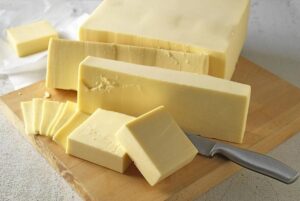 When it comes to cheese, it’s a beloved food for many people. However, for those who are lactose intolerant and vegetarians, not being able to enjoy this delicious treat can be a source of frustration. That’s where plant-based cheese (the Cheese Substitutes) comes into play, serving as a perfect cheese substitute. However, achieving the texture and taste of animal-based cheese in plant-based cheese (the Cheese Substitutes) requires the use of some additives.
When it comes to cheese, it’s a beloved food for many people. However, for those who are lactose intolerant and vegetarians, not being able to enjoy this delicious treat can be a source of frustration. That’s where plant-based cheese (the Cheese Substitutes) comes into play, serving as a perfect cheese substitute. However, achieving the texture and taste of animal-based cheese in plant-based cheese (the Cheese Substitutes) requires the use of some additives.
Difference Between Regular Cheese and Plant-Based Cheese
Origin
Regular Cheese: Derived from animal milk, usually cow, goat, sheep, or buffalo milk, primarily composed of milk protein, specifically casein.
Plant-Based Cheese: Made from plant ingredients like nuts (e.g., cashews, almonds), soy, coconut, tapioca, and even certain vegetables and legumes.
Production
Regular Cheese: Produced by coagulating milk to separate curds and whey, followed by processing, seasoning, and aging. Rennet, often from animal stomachs, aids in coagulation.
Plant-Based Cheese: Production varies with ingredients. Nut-based cheeses involve soaking, blending, and fermenting nuts, along with binders, thickeners, and gelling agents for texture.
Nutrition
Regular Cheese: Typically rich in protein, calcium, and saturated fat, but also contains cholesterol and lactose.
Plant-Based Cheese: Nutrition varies. Generally lactose-free and may or may not match dairy cheese’s protein content. Some are fortified with nutrients like calcium and vitamin B12.
Taste and Texture
Regular Cheese: Dairy cheeses have well-established taste and texture, ranging from creamy (e.g., brie) to crumbly (e.g., parmesan).
Plant-Based Cheese: Replicating the exact taste and texture of dairy cheese remains a challenge. Some excel in meltability and flavor, while others require help from phosphate additives.
Understanding the Role of Phosphates in Cheese Making
Before diving into specific phosphate choices, it’s essential to grasp why they are critical in cheese manufacturing.
Texture and Consistency: Phosphates can significantly impact a cheese’s texture, ensuring it’s smooth and devoid of any undesirable granularity.
Melting Quality: One of the most loved aspects of cheese is its melt-in-your-mouth quality, especially when heated. Phosphates can aid plant-based cheese (the Cheese Substitutes) to mimic this melting characteristic of dairy cheeses.
pH Balance: Maintaining the right pH in cheese is crucial for taste and preservation. Phosphates help regulate this balance.
What Blended Phosphate is for Plant-Based Cheese (the Cheese Substitutes)?
The introduction of blended phosphates in plant-based cheeses isn’t arbitrary. They play a series of roles that enhance the product in various ways.
Texture and Consistency Enhancement
One of the primary challenges with plant-based cheese (the Cheese Substitutes) is achieving the right texture. Dairy cheeses have a specific meltability, stretch, and consistency, which consumers have come to expect. Blended phosphates Mix-BT70 and Mix-FS72 help in adjusting the texture of plant-based cheese (the Cheese Substitutes), making them smoother and enhancing their meltability.
pH Control
The pH level of food can influence its taste, texture, and shelf life. Blended phosphates Mix-C120 and Mix-C40 help in maintaining and regulating the pH level of plant-based cheese (the Cheese Substitutes), ensuring it remains consistent throughout its shelf life.
Moisture Retention
Dry and crumbly cheese isn’t generally appealing. Phosphates Mix-SE helps retain moisture in plant-based cheese (the Cheese Substitutes), ensuring they remain moist and palatable.
Extended Shelf Life
plant-based cheese (the Cheese Substitutes), due to its organic components, can be susceptible to spoilage. Blended phosphates Mix-T act as preservatives, enhancing the product’s shelf life and preventing early spoilage.
Overall, blended phosphates, when used correctly and responsibly, can play a pivotal role in improving the quality of plant-based cheese(the Cheese Substitutes), making them a more appealing choice for consumers.
Reaching out to [email protected] to obtain the blended phosphate for the cheese substitutes right now!




